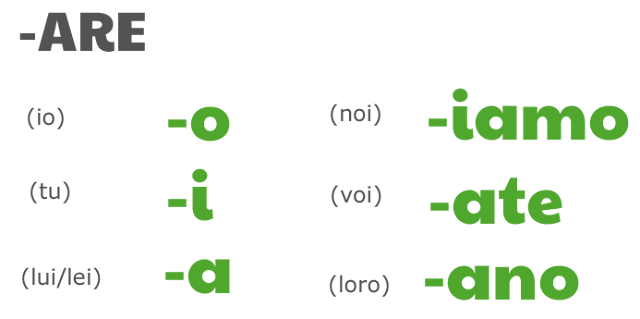OUR NEW NAME AND ADDRESS IS VIA OPTIMAE! {www.viaoptimae.com}
Didattichiamo! will slowly be phased out, so read this post on our new site and subscribe by email to receive our latest updates.
Grammar books throw around terms like infinitive, person, conjugation, tense, regular and irregular all the time... but what do they really mean?
All those terms are related to verbs and can be useful to understanding how Italian verbs work, so let's break them down:
INFINITIVE
Infinitive refers to the most basic form of the verb, the general verb that tells us nothing of tense (when it occurs) or person (who did it.)
In English, infinitives have the word "to" in front of them.
to speak
to eat
to read
to write
to sleep
to finish
As you can see in the above examples, these have a very general meaning. They refer to the action itself, and have no subject or time.
In Italian, infinitive verbs always end with one of three endings: -ARE -ERE or -IRE.
parlare
mangiare
leggere
scrivere
dormire
finire
These are the same verbs from the English infinitives, and have the same meaning- they refer to the action itself and have no person or time.
PERSON
Person refers to the subject or the one doing the action. In Italian and English, they are:
If you hear somebody say "1st person singular" just know that's a fancy way of saying "I" or "io." If you hear third person plural, that's just "they" or "loro." Easy right?
CONJUGATION
Verb endings are very important in Italian because they contain a lot of information about the tense (when the action occurred) and the subject (who did it.) As we saw before, infinitives always have one of three endings: -ARE, -ERE or -IRE and the rest of the verb is what we call the stem or root:
To express another time or tense, you change the infinitive ending (again -ARE, -ERE, or -IRE) with the ending for that tense and subject.
In the following example, I want to conjugate parlare in the 1st person (io) present tense, so the ending I use is 'o':
Here, I've CONJUGATED the verb parlare 'to speak' into the first person present tense: parlo 'I speak'. As you can see, all the information is in the verb ending.
TENSE
Learning a new tense in Italian means learning new sets of verb endings. In general, there are different endings for each verb group (-ARE, -ERE or -IRE) and for each person (io, tu, lui/lei, noi, voi, loro)
(This may seem like a lot, but the variations from one group to the next become quite intuitive once you've learned one of them!)
Let's look at the simple present tense endings for -ARE verbs:
TIP: When learning a new tense, write out all the conjugations in a two column, three line chart like the one above. That way, the subjects will be clear without having to write them out every time.
Given the above endings and the fact that the root of 'parlare' is 'parl-' we can write out the present tense conjugations of 'parlare':
REGULAR/IRREGULAR
If a verb is Regular, that means it follows the predictable conjugation pattern. 'Parlare' in the example above, is regular: drop -ARE and add the present tense endings, and those are the present tense forms.
There are many regular verbs, so once you've learned how to conjugate one, you can figure out the conjugations of many others.
For example, 'fermare' 'to stop' is also a regular verb. Use the -ARE ending chart above if needed, write out the present tense conjugations of 'fermare':
(Highlight the space below to reveal the answers)
io fermo noi fermiamo
tu fermi voi fermate
lui/lei ferma loro fermano
IRREGULAR verbs are ones that don't follow the predictable patterns above. A very common irregular verb is 'essere' 'to be' You cannot drop the -ERE and add endings, instead you must memorize each conjugation: (This verb is used so frequently, you'll have it memorized in no time, don't worry!)
We'll cover the -ERE and -IRE present tense conjugations in a later post (stay tuned!) but in the meantime...
How are we feeling? Are all these grammar terms starting to make sense? Anything you're still not sure about? Feel free to comment to this post or email me using the email form on the righthand side of the page... I'm happy to help!












No comments :
Post a Comment